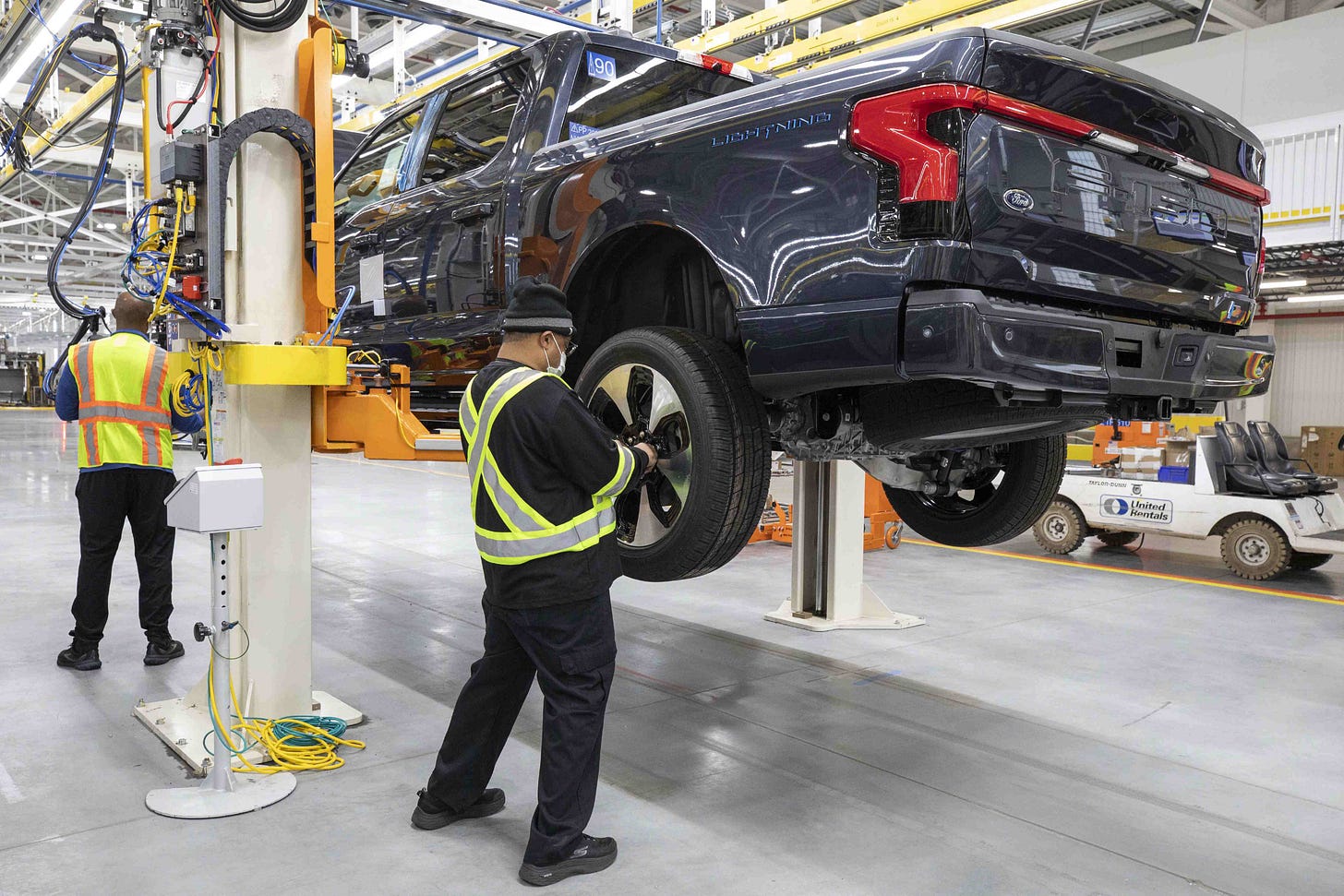TL(PM) DIGEST: The interest rate hikes will continue until morale improves
Plus America's long and winding road toward electric vehicle adoption, a potential breakthrough on Chinese debt forgiveness, and poor ratings all around for federal elected officials

1. New inflation report contains mixed messages once again
What happened? Depending on your news source, inflation has either eased to its lowest point in two years—about 5 percent—or it remains stubbornly elevated as core inflation continues to rise.
Why does it matter? The Federal Reserve’s ongoing efforts to tame inflation have produced modest effects but nowhere near the targeted reduction goal of 2 percent inflation. As the Financial Times reports:
The consumer price index for March rose by 5 per cent year on year, according to data published by the Bureau of Labor Statistics on Wednesday. That marks a significant deceleration compared with the 6 per cent rate recorded in February and is the lowest reading since May 2021. On a monthly basis, consumer prices increased just 0.1 per cent, shy of economists’ forecasts.
However, core CPI, a closely watched inflation measure that strips out volatile energy and food costs, rose by 5.6 per cent year-on-year after a 0.4 per cent monthly jump, suggesting price pressures for some goods and services remain elevated.
TLP’s take: The lack of consensus among central bankers and policymakers on anti-inflation policy leaves regular Americans feeling uneasy about the economy—and their own financial stability. It seems probable that more rate hikes will be pursued by the Fed to bring inflation fully under control. That likely means hard times for many people ahead in terms of job losses and lower wages—and policymakers need to start preparing to help people out now.
In practice, this means looking at ways fiscal policy decisions and monetary policy decisions directly impact America's workers and businesses, and ensuring that these policy moves strengthen America's overall economy and its ability to compete in the world.
2. America’s long road to widespread electric vehicle adoption
What happened? The Biden administration looks set to adopt stringent new emissions standards that could require two-thirds of all new vehicles made in America to be electric by 2032. “Under the most aggressive proposal,” the Washington Post reports, “automakers would have to cut emissions for the passenger cars and pickups they sell in model year 2032 by more than half from 2026, the last model year governed under current rules.”
Why does it matter? While American automakers have begun to shift car production en masse from internal combustion engines to electric motors, the United States still faces significant obstacles to meeting even the Biden administration’s previous goal of making electric vehicles half of all those sold in America by 2030. The availability of lithium, crucial to making EV batteries, remains a concern, for instance, and the necessary new EV and battery manufacturing plants are still under construction.
TLP’s take: It’s one thing to set an ambitious goal and get Congress to pony up the money required, but it’s quite another to actually execute and achieve it—particularly when the goal involves widespread coordination between the public and private sectors. The Biden administration would do well set up a single office or agency to oversee America’s transition to electric vehicles—or empower an existing one—rather than proceed with business as usual.
3. Sidestepping a bailout of Beijing’s bad loans
What happened? The Wall Street Journal reports that talks appear to be progressing on a plan that would see the Chinese government drop its demands that the World Bank, International Monetary Fund, and other international financial institutions take hits in order for Beijing to restructure the bad loans it made to a number of developing countries in recent years—debts those countries have found onerous in the wake of the COVID-19 pandemic. In exchange, regional development banks like the Asian Development Bank and African Development Bank would make “more explicit commitments to provide fresh low-cost financing, including grants, to countries whose debt is being restructured.”
Why does it matter? Beijing has been the main stumbling block to international debt relief for developing countries, effectively insisting that the United States, European Union, and international financial institutions bail out its own bad loans. If it goes through—a big if—this compromise could help ease the debt burdens on developing nations facing unsustainable debt burdens after the COVID-19 pandemic and resulting global economic turmoil, debts contracted for big infrastructure projects that crumble almost as soon as they’re finished.
TLP’s take: America and its partners have rightly refused Beijing’s preposterous conditions for debt relief—we’re not on the hook for bad loans the Chinese state and its state-linked banks have made. This potential compromise is nonetheless worth exploring at today’s Global Sovereign Debt Roundtable, even if nothing ultimately comes from it.
What happens in the global economy, including in developing countries facing major economic strains, has the potential to affect America's economy—meaning America has an interest in pragmatic solutions to challenges like the growing debt crisis in poorer countries.
4. Americans hold dim views of President Biden and both parties in Congress
What happened? New research from Pew shows that 6 in 10 Americans disapprove of the way President Biden is handling his job, while two-thirds also disapprove of the job Democrats are doing in Congress and nearly 7 in 10 disapprove of Republicans in Congress.
Why does it matter? The change in hands of the House of Representatives has done nothing to improve voters’ views of anyone in politics. As Pew reports, Americans also remain quite sour about the state of the economy with nearly half, 46 percent, expecting economic conditions to worsen over the next year.
TLP’s take: It’s not at all clear that anyone in charge of the two parties has a plan to address the core economic fears of Americans—namely, inflation—rather than touting past legislative action or escalating culture war fights. At a minimum, the leaders of the Republican Party should not make matters worse by blowing up the economy over the debt ceiling and letting the government shut down.
Just one more thing…
60 Minutes reports on the breathtaking new images of the galaxy-filled universe beamed back by the James Webb Space Telescope.





